Slate pool tables are better due to their consistent, flat surface, ensuring accurate ball movement, and are favored in professional settings. While wood tables are suitable for casual play and blend well with home decor, they are more susceptible to warping and less precise.
Billiards, also known as pool, is a popular leisure activity enjoyed by many people worldwide. It is a great way to unwind, socialize, and improve your hand-eye coordination and strategic thinking skills. When it comes to buying a pool table, one of the essential factors to consider is the playing surface material.
The two most common materials used for billiard tables are slate and wood. Slate billiard tables offer superior playability due to their consistent, flat surface, ensuring accurate ball movement, and are favored in professional settings. On the other hand, wood tables, while more susceptible to warping and less precise, are suitable for casual play and blend well with home decor. This article provides a detailed comparison between slate and wood pool tables to help you choose the right material for your needs.

Credit: www.amazon.com
Slate Vs Non-slate Pool Tables
Slate pool tables offer superior playability compared to non-slate ones. A flat and consistent surface ensures accurate ball movement, making them popular in professional settings. Wood tables are suitable for casual play and blend well with home decor, but are more prone to warping and less precise.
Understanding The Differences
When it comes to buying a pool table, one of the biggest decisions you’ll have to make is whether to choose slate or non-slate. Slate pool tables are the more traditional option and are often seen in professional settings. In contrast, non-slate tables are more affordable and tend to be made of materials such as wood or MDF.
Pros And Cons
There are pros and cons to both slate and non-slate pool tables, so it’s important to consider your specific needs and preferences before making a decision.
| Slate Pool Tables | Non-Slate Pool Tables |
|---|---|
| Consistent, flat playing surface | Less expensive |
| Long-lasting durability | Lighter and easier to move |
| Provides professional-grade playability | May not provide as much accuracy |
| Requires professional installation | May not blend well with home decor |
Ultimately, whether a slate table is better than a non-slate table depends on what factors matter most to you. For serious players or those who want to invest in a long-lasting piece of furniture, a slate table is likely the better choice. However, for more casual players or those who want to save money, a non-slate table may be a more suitable option.
When it comes to choosing between slate and non-slate pool tables, it’s all about weighing the pros and cons and deciding which factors are most important to you.

Credit: m.youtube.com
Mdf Vs Slate Pool Tables
Slate pool tables are generally considered better than MDF tables because they offer a consistent, flat surface ensuring accurate ball movement. While MDF tables may be cheaper and easier to move, they are less precise and not favored in professional settings.
MDF vs Slate Pool Tables: Comparing Features and Which One to Choose
When it comes to buying a pool table, one of the first decisions you need to make is whether to go for an MDF (Medium-Density Fiberboard) or slate table. MDF tables are cheaper and lighter, making them easy to move around. However, slate tables are favored by professional players due to their consistent and flat surface, ensuring accurate ball movement. In this post, we’ll compare the features of MDF and slate pool tables and help you choose which one is right for you.
Comparing Features
Price: MDF tables are significantly cheaper than slate tables.
Weight: MDF tables are much lighter than slate tables, making them easier to move around.
Surface: Slate tables offer a much more consistent and flat surface than MDF tables, ensuring accurate ball movement.
Cloth: Slate tables are usually covered with higher-quality cloth than MDF tables, which can affect ball speed and accuracy.
Cushions: Slate tables usually have higher-quality cushions, which can affect ball rebound and accuracy.
Pockets: Slate tables often have better-quality pockets, which can affect ball return and accuracy.
Which One To Choose
Ultimately, the decision between MDF and slate pool tables depends on your preferences and budget. If you’re on a tight budget and don’t take your game too seriously, then an MDF table could be a good choice for you. However, if you’re a serious player or want the best quality table, then a slate table is the way to go.
Overall, slate pool tables are better than MDF tables in terms of playability and accuracy, offering a superior gaming experience. However, they come with a price tag and are heavier, making them harder to move. So, consider your budget, your level of play, and your space constraints before making a decision.
Factors To Consider
When considering whether slate pool tables are better, there are several factors to keep in mind. Slate tables have a consistent, flat surface that ensures accurate ball movement, making them preferable in professional settings. However, wood tables are suitable for casual play and may blend better with home decor.
Other important variables to consider include table cost, weight, and maintenance requirements.
Factors to Consider: Durability, Pricing, Portability, and Accessories
Are you in the market for a pool table and wondering whether a slate or non-slate table is better? There are several factors to consider before making a decision, including durability, pricing, portability, and accessories. Let’s take a closer look at each of these factors.
Durability
When it comes to durability, slate pool tables are the clear winner. Slate is a dense, rock-like material that can withstand heavy use and last for decades without warping or deteriorating. Non-slate tables, on the other hand, are made of MDF (medium-density fiberboard) or plywood, which are less durable and more susceptible to warping over time.
Pricing
Slate pool tables tend to be more expensive than non-slate tables, largely due to the cost of the slate itself. However, investing in a slate table can be worth it in the long run if you’re looking for a table that will last for many years. Non-slate tables are generally less expensive, but they may need to be replaced more frequently.
Portability
If you’re looking for a pool table that can be easily moved or stored when not in use, a non-slate table may be a better choice. These tables are typically lighter and come with features like folding legs that make them easy to move. Slate tables, on the other hand, are very heavy and can be difficult to move once they’re installed.
Accessories
Both slate and non-slate pool tables can come with a variety of accessories, including cues, balls, racks, and covers. However, there are some accessories that may be more suited to one type of table over the other. For example, slate tables may require special cues and balls to avoid damaging the playing surface, while non-slate tables may come with built-in pockets or other unique features.
In conclusion, the decision between a slate or non-slate pool table depends on several factors, including durability, pricing, portability, and accessories. Each type of table has its own advantages and disadvantages, so it’s important to consider your needs and preferences before making a decision.
Expert Opinions
Expert opinions vary on whether slate pool tables are better than non-slate alternatives. While slate tables provide a consistent playing surface and are favored in professional settings, non-slate wooden tables offer a more casual option that can blend well with home decor.
Consider your intended use before choosing a pool table material.
Expert Opinions
When it comes to choosing between a slate and non-slate pool table, it can be hard to know which one to choose. However, experts in the billiards industry have shared their opinions on the matter to help you make an informed decision.
Professional Players’ Preference
Professional pool players have a clear preference when it comes to choosing a pool table. They opt for slate pool tables due to the consistent and flat surface that allows for accurate ball movement. In professional settings, this is crucial for a fair and competitive game. As highlighted by Blatt Billiards, professional players typically look for a table with a slate bed, which can be a single piece or three smaller pieces.
Billiards Table Buyers Guide
If you’re looking to buy a pool table, it’s important to consider the type of bed material carefully. The Family Leisure Indianapolis Billiards Table Buyers Guide suggests taking the following factors into account:
The Slate
The slate on a pool table should be at least one inch thick and of high quality. It’s important to ensure the slate has been properly installed, as even slight deviations from a flat surface can lead to uneven ball rolls.
Frame Construction
The frame construction of the pool table should be sturdy and made from hardwood. The frame acts as a support for the slate bed, so it’s crucial that it’s strong enough to handle the weight.
Cushions
The cushions are an integral part of the pool table, as they determine how the balls bounce off the rails. Make sure they are made from high-quality materials and maintain a consistent angle throughout.
Billiards Cloth
The cloth on a pool table should be of high quality and durable, as it will eventually wear down with use. The color is a matter of personal preference, but it’s important to ensure the cloth is smooth and does not affect the ball’s roll.
Overall, investing in a high-quality slate pool table is worth the investment for those who take their billiards seriously. However, if you’re looking for a more casual table for home use, a non-slate table may suffice. Ultimately, the choice is up to personal preference and budget constraints.

Credit: www.amazon.com
Frequently Asked Questions Of Are Slate Pool Tables Better
Which Is Better Slate Or Non-Slate Pool Table?
Slate pool tables offer better playability and accuracy due to their consistent, flat surface and are preferred in professional settings, while non-slate or wooden tables are suitable for casual play and blend well with home decor. Slate tables are more durable and will always be perfectly flat, allowing for precise shots.
Are Professional Pool Tables Slate?
Yes, professional pool tables are often made with slate. Slate offers superior playability due to its flat and consistent surface, ensuring accurate ball movement, which is favored in professional settings. Wooden tables are more suitable for casual play and blend well with home decor. A slate pool table is also highly durable and can last for decades with proper care.
Does Slate Pool Table Break Easy?
Slate pool tables offer superior durability and playability due to their flat, consistent surface, ensuring accurate ball movement. They are favored in professional settings, while wood tables, while less precise and more susceptible to warping, are suitable for casual play and blend well with home decor. A slate table will always be perfectly flat, making shots more precise and last for decades with proper care. So, slate pool tables are not easy to break.
Is It Ok To Stand On A Slate Pool Table?
No, it is not OK to stand on a slate pool table as it can damage the table and cause it to be unlevel, affecting the game’s accuracy. The slate is fragile and can crack or break under the weight of a person. It is better to use a pool table as intended for playing and avoid standing or sitting on it.
Are Slate Pool Tables More Durable?
Slate pool tables are sturdier compared to non-slate ones. They have a stone bed that ensures consistency and flatness, making them last for several years.
Conclusion
While both slate and non-slate pool tables have their pros and cons, slate tables offer superior playability due to their consistent, flat surface. Slate tables are favored in professional settings for this very reason. However, wooden tables are more suitable for casual play and can blend in well with home decor.
Ultimately, your choice of table should depend on your skill level, budget, and intended usage. By weighing all these factors carefully, you can make a well-informed decision and choose a pool table that meets your needs perfectly.
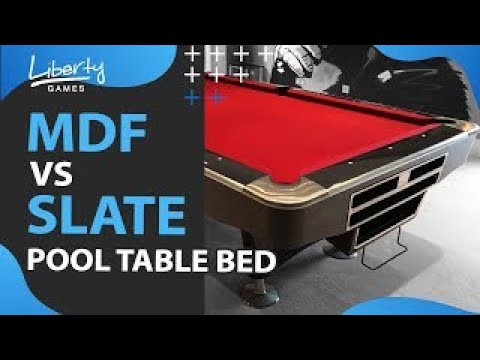
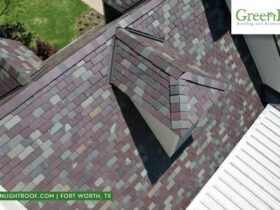




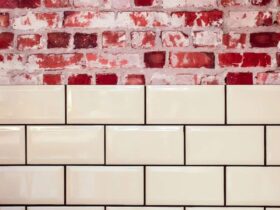
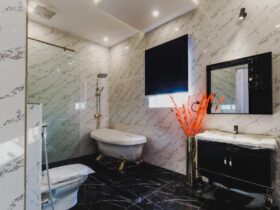
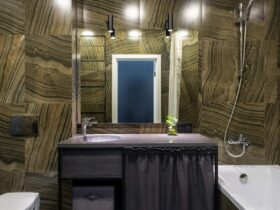
Leave a Reply